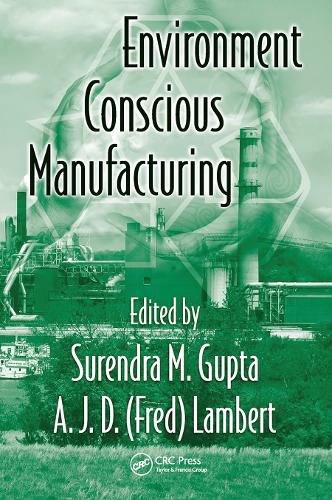Readings Newsletter
Become a Readings Member to make your shopping experience even easier.
Sign in or sign up for free!
You’re not far away from qualifying for FREE standard shipping within Australia
You’ve qualified for FREE standard shipping within Australia
The cart is loading…






Hotter temperatures, less arctic ice, loss of habitat-every other day, it seems, global warming and environmental issues make headlines. Consumer-driven environmental awareness combined with stricter recycling regulations have put the pressure on companies to produce and dispose of products in an environmentally responsible manner. Redefining industrial ecology, while reconsidering the original definition, Environment-Conscious Manufacturing explores topics such as industrial metabolism, product design for the environment, design of reverse and closed-loop supply chains, and disassembly modeling, using case studies to support the discussion. After introducing basic concepts and the historical roots of environment conscious manufacturing (ECM), the text covers algorithms and heuristics; design for disassembly; the environment, recycling, and remanufacturing; disassembly process planning and scheduling; environmental impact assessment models; lifecycle assessment; logistic aspects; product reuse and recovery; and sustainable products. The chapter contributors discuss the selection of economical products, collection centers, recovery facilities, production facilities, second-hand markets and new products, the optimal transportation of goods, and the evaluation of a marketing strategy and futurity of used products. The book ends with an overview of the barriers to ECM and explores how to use integrative structural modeling to investigate, analyze, and overcome them.
Environmentally friendly has evolved from reluctant compliance with required regulations to a mechanism for gaining the competitive advantage and an important part of strategic management. Expected benefits of this paradigm shift include safer and cleaner facilities, lower future costs for disposal and worker protection, reduced environmental and health risks, and improved product quality at lower cost and higher productivity. Describing the basic elements of ECM, this book gives you the tool
$9.00 standard shipping within Australia
FREE standard shipping within Australia for orders over $100.00
Express & International shipping calculated at checkout
Hotter temperatures, less arctic ice, loss of habitat-every other day, it seems, global warming and environmental issues make headlines. Consumer-driven environmental awareness combined with stricter recycling regulations have put the pressure on companies to produce and dispose of products in an environmentally responsible manner. Redefining industrial ecology, while reconsidering the original definition, Environment-Conscious Manufacturing explores topics such as industrial metabolism, product design for the environment, design of reverse and closed-loop supply chains, and disassembly modeling, using case studies to support the discussion. After introducing basic concepts and the historical roots of environment conscious manufacturing (ECM), the text covers algorithms and heuristics; design for disassembly; the environment, recycling, and remanufacturing; disassembly process planning and scheduling; environmental impact assessment models; lifecycle assessment; logistic aspects; product reuse and recovery; and sustainable products. The chapter contributors discuss the selection of economical products, collection centers, recovery facilities, production facilities, second-hand markets and new products, the optimal transportation of goods, and the evaluation of a marketing strategy and futurity of used products. The book ends with an overview of the barriers to ECM and explores how to use integrative structural modeling to investigate, analyze, and overcome them.
Environmentally friendly has evolved from reluctant compliance with required regulations to a mechanism for gaining the competitive advantage and an important part of strategic management. Expected benefits of this paradigm shift include safer and cleaner facilities, lower future costs for disposal and worker protection, reduced environmental and health risks, and improved product quality at lower cost and higher productivity. Describing the basic elements of ECM, this book gives you the tool